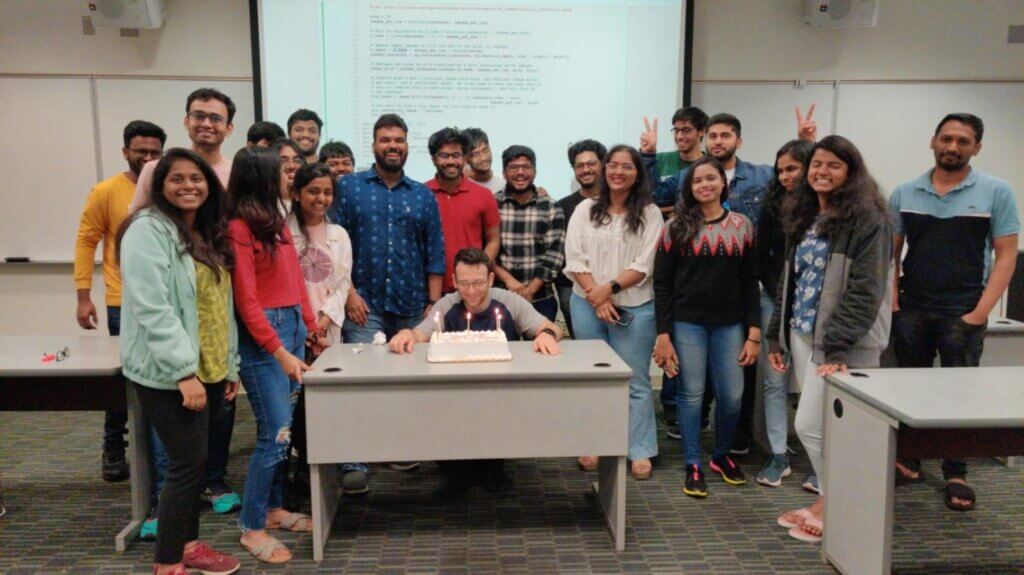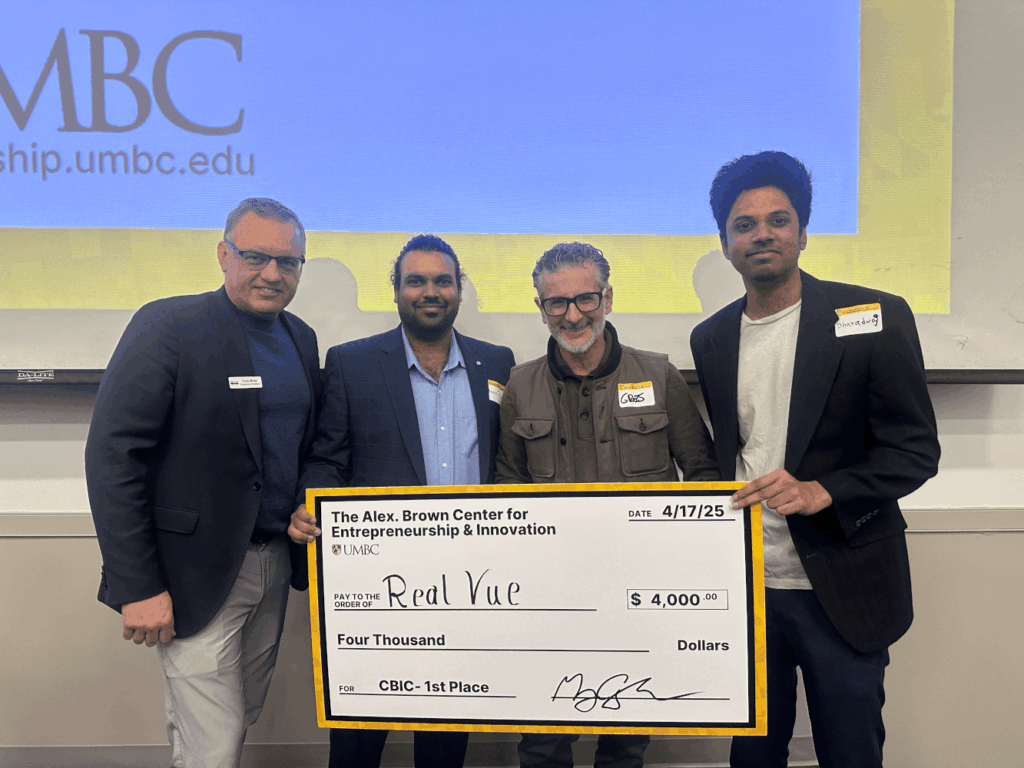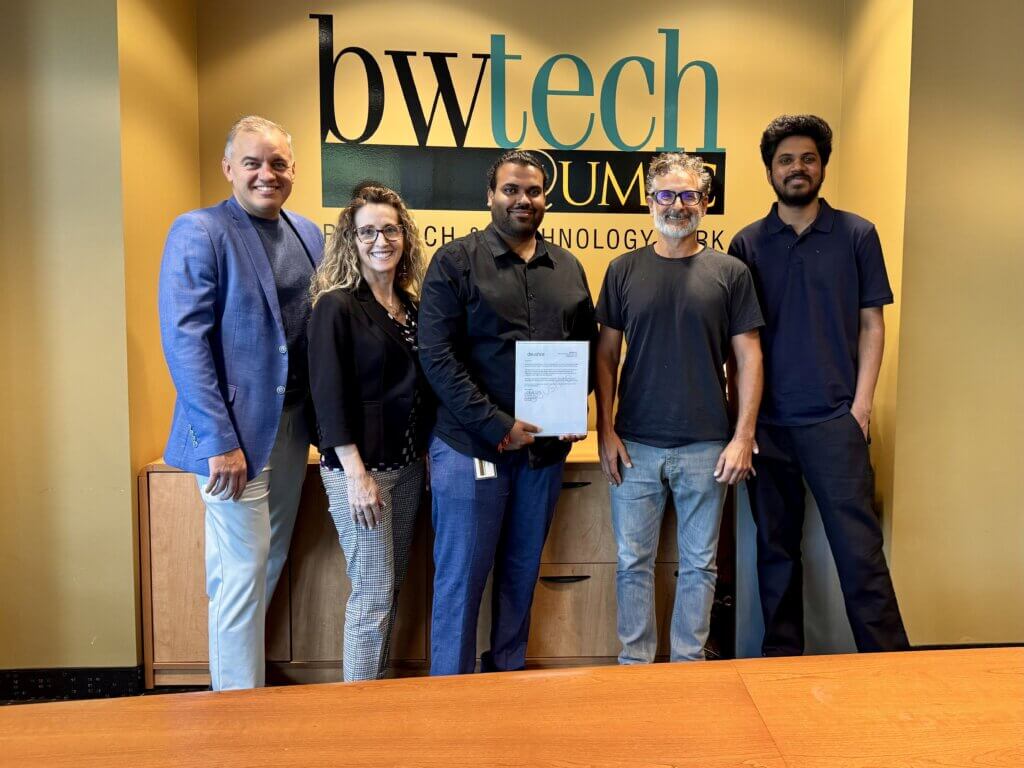Every success story begins with resilience and vision. For Harish Reddy Manyam, M.P.S. ’24, Data Science, that story started when he arrived in the United States from India with just two things: a visa and a dream.
Today, Harish works as an AI governance advisor and healthcare data scientist, but the road to that career was anything but simple. His journey reflects the unique blend of academic rigor, professional opportunity, and community support that defines the UMBC Data Science M.P.S. program.
In this interview for UMBC’s Mic’d Up Podcast, Harish shares the milestones that shaped his path — from early challenges to entrepreneurial ventures. Additionally, he offers advice for students pursuing futures in data science and artificial intelligence.
Responses have been lightly edited for clarity while preserving the speaker’s intent.
Early Challenges and Milestones in Data Science
Dennise:
You arrived in the U.S. as an international student. What milestones and challenges shaped your path into data science?
Harish Reddy Manyam, M.P.S. ’24, Data Science:
When I landed in the United States, I faced immediate challenges. I knew little about daily life here and had almost no resources. Those early struggles taught me resilience and gave me perspective.
The first big milestone came quickly. During my first semester, I secured an internship at the Maryland Department of Health through the Maryland Technology Internship Program. There, I applied SQL and Python to analyze behavioral health data. That hands-on work showed me how data science improves real-world systems.
Later, I collaborated on research with Dr. Ergun Simsek, publishing results that demonstrated the practical impact of machine learning. Earning a graduate assistantship in my third semester gave me confidence. It showed me the UMBC community believed in me before I fully believed in myself.
I also gained industry exposure through a co-op at Conscious Venture Partners and a fellowship with the Maryland Momentum Fund. Each experience built toward the next, and together, they created a foundation that prepared me for a career in data science.
Through Governor Wes Moore’s Maryland Technology Internship Program, I landed my first role at the Department of Health. That changed everything.
The Transformative Impact of UMBC’s Data Science Program

Dennise:
Looking back, what aspects of your data science career journey had the greatest impact?
Harish:
The confidence and community at UMBC shaped my growth. Professors and peers offered encouragement that pushed me to aim higher.
The program balanced theory with application. Courses included projects grounded in real-world data. For example, one project analyzed personal browsing history to predict daily habits and job application patterns. That assignment challenged me to connect machine learning with actual human behavior.
UMBC’s Data Science program constantly asked, “How does this model change lives?” That mindset shifted my perspective from focusing only on algorithms to seeing the broader impact of data science in society.
Developing a No-Code AI Chatbot at UMBC
Dennise:
You co-developed a no-code generative AI chatbot. How did that project come about?
Harish:
During Professor Abdullah Karasan’s class, I recognized a gap. Many organizations want to use AI but lack technical staff.
We created a no-code chatbot platform that enabled nonprofits, startups, and student organizations to design conversational tools without programming knowledge.
The project had immediate impact. One nonprofit used the chatbot to automate donor communications, saving hours each week. More importantly, the project showed me that AI should be democratized. Technology should empower everyone, not only experts. That lesson continues to guide my career.

Lessons Learned Through Research in Electromagnetics
Dennise:
You also conducted research in electromagnetics. How did that influence your skills?
Harish:
Research with Dr. Simsek pushed me far outside my comfort zone. I applied neural networks to complex problems in electromagnetics.
The project demanded discipline and persistence. Improving model accuracy from 83% to 91% required focused effort and careful iteration.
That experience strengthened my problem-solving skills. Later, when I worked with healthcare data involving millions of records, I knew how to break down large, complicated problems into manageable steps.
Recognition as a Maryland Momentum Fund Fellow
Dennise:
You were named a Maryland Momentum Fund Fellow. What did that recognition mean to you?
Harish:
The fellowship was a turning point. I was the only UMBC student selected, and that recognition validated my work and ideas.
It gave me access to investors, mentors, and Maryland’s entrepreneurial network. I began to see my projects not only as academic exercises but as potential ventures with real-world impact.
The fellowship provided confidence, connections, and resources that accelerated my career. It reminded me that my work belonged in larger conversations about innovation and entrepreneurship.
Entrepreneurial Growth Through BW Tech at UMBC

Dennise:
BW Tech at UMBC played a role in your startup journey. Can you share how?
Harish:
BW Tech became my second home. Mentors encouraged me to compete in UMBC’s Business Innovation Competition. My team won first place, gaining both credibility and funding.
Through UMBC’s Launchpad accelerator, we received $12,000 in seed funding. BW Tech also provided office space and consistent guidance as we developed our venture.
That environment normalized ambition. At BW Tech, pursuing big dreams in AI entrepreneurship felt achievable. For me, the support was transformative.
Applying AI in Healthcare to Improve Patient Outcomes
Dennise:
You now work in healthcare AI. How are you applying data science in this field?
Harish:
At Marshfield Clinic Health System, I use AI to support patient care. Recently, my team developed a predictive model for care management.
The model analyzes historical claims data to identify patients at higher risk of chronic conditions such as COPD or heart failure. With 92% accuracy, the tool helps providers allocate resources effectively.
Projects like this demonstrate the power of AI in healthcare. Data science does more than solve technical problems — it improves patient outcomes and strengthens health systems.
Preparing for an AI-Driven Future
Dennise:
What advice do you have for students preparing for an AI-driven future?
Harish:
I have three recommendations: focus on fundamentals, build real projects, and stay adaptable.
Tools and technologies evolve quickly, but curiosity and problem-solving never lose value. Build projects that showcase your skills in practice. Employers value portfolios more than certificates.
Finally, stay flexible. Many future jobs in AI don’t exist yet. The best way to prepare is to keep learning and remain curious. In my view, curiosity is the greatest currency in AI.
The Value of UMBC Graduate Study in Data Science
Dennise:
What would you say to someone considering UMBC for graduate study
Harish:
UMBC offers more than an education. Professors know your name, challenge your thinking, and connect you with industry opportunities.
The return on investment goes beyond salary. The true value comes from the impact you create, the opportunities you access, and the community you join.
My own international student success path included internships, research, fellowships, and entrepreneurial ventures — all supported by UMBC. For me, the program was not just an academic investment. It was a launch pad for everything that followed.
Conclusion
Harish Reddy Manyam’s story illustrates how UMBC’s Data Science M.P.S. program empowers students to succeed in rapidly evolving fields. His journey from international student to AI governance advisor highlights resilience, innovation, and the power of community.
For those considering UMBC graduate programs, we offer confidence, connection, and real-world opportunities. With the right support, big dreams become achievable careers.
Watch the full recorded podcast on YouTube
You can also listen to this episode on your favorite podcast player.
